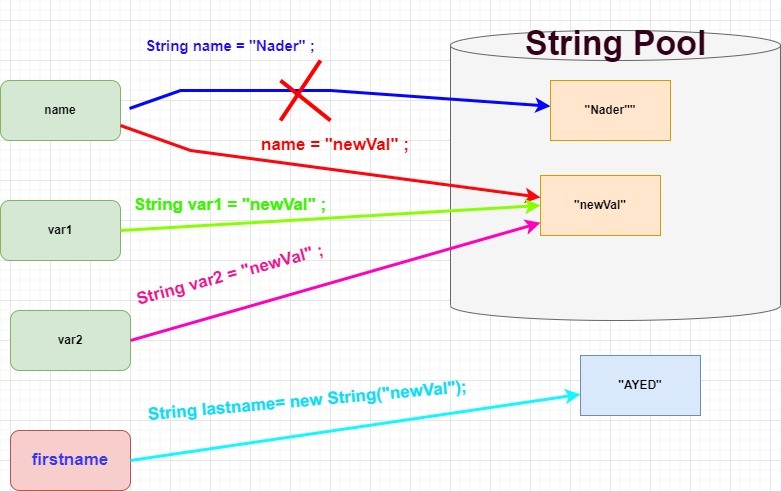What Is Immutable Strings and Exactly How It Works
In the world of programs, comprehending the principle of unalterable strings is paramount for creating durable and protected applications. Immutable strings describe strings that can not be changed after they are created, guaranteeing information honesty and predictability within the code. This essential principle plays an important duty in different programs languages and uses a special method to managing data. By checking out the complexities of exactly how unalterable strings work, one can uncover a globe of benefits and possibilities that can raise the top quality and performance of software program development.
The Essentials of Immutable Strings
Immutable strings, as a fundamental concept in programming, are character sequences that can not be transformed when they are created. This means that once a string is appointed a worth, that worth can not be changed. In languages like Python and Java, strings are immutable things, causing numerous ramifications in terms of memory management and data integrity.
One of the crucial benefits of unalterable strings is that they give a feeling of safety in information adjustment. Since the web content of an immutable string can not be modified, it makes certain that the initial information continues to be undamaged, reducing the danger of unintentional modifications throughout program implementation (Why are strings immutable in Java?). This property additionally simplifies debugging processes, as designers can trust that once a string is defined, its value will certainly not be inadvertently altered
Furthermore, unalterable strings assist in reliable memory use. When a brand-new string is produced based on an existing one, as opposed to modifying the original string, the brand-new worth is saved individually. This approach enhances performance by lowering memory fragmentation and streamlining memory allotment procedures. Overall, comprehending the essentials of immutable strings is essential for mastering shows concepts and maximizing code efficiency.
Advantages of Immutable Strings
Building upon the safety and efficiency advantages of immutable strings, their benefits include improving code reliability and streamlining concurrent programs jobs. By being unalterable, strings can not be changed after development, which removes the danger of unintentional modifications in the data they save. This intrinsic immutability guarantees that as soon as a string is produced, its worth continues to be consistent throughout the program's implementation, minimizing the possibilities of insects triggered by unforeseen alterations.
Furthermore, unalterable strings contribute to code reliability by making it much easier to reason about the state of a program. Since strings can not be changed, designers can rely on that a string will constantly hold the same value, streamlining debugging and upkeep initiatives. This predictability leads to extra secure and reputable codebases.

Implementation in Shows Languages
Within different programs languages, the consolidation of immutable strings is an essential element that affects just how information is handled and adjusted within code frameworks. The execution of immutable strings differs across various programs languages, with each language supplying its own mechanisms to support this concept.

In contrast, languages like C and C++ do not have integrated support for unalterable strings. Programmers in these languages need to manually implement immutability by applying regulations within their code to avoid straight modifications to string items.
Ideal Practices for Functioning With Unalterable Strings
When managing immutable strings in programming languages like Java and Python, adhering to ideal methods ensures efficient and safe data control. Among the essential ideal methods is to use StringBuilder or StringBuffer rather of straight controling strings, specifically when dealing with comprehensive concatenation procedures. These classes provide mutable alternatives for string adjustment, helping to prevent unneeded memory allocations and boosting performance.
Furthermore, when working with sensitive information such as passwords or API tricks, it is vital to stay clear of storing them as simple message in immutable strings. Making use of safe storage mechanisms like char varieties or specialized libraries for handling sensitive information assists minimize safety and security threats connected with immutable strings.
Real-world Applications and Examples
Checking out practical implementations of unalterable strings in various industries reveals their considerable effect on information integrity and system dependability. In the healthcare market, immutable strings play a crucial function in making sure the security and privacy of individual data. By protecting against unauthorized adjustments to sensitive info such as clinical documents useful source and prescriptions, unalterable strings aid maintain conformity with strict privacy policies like HIPAA.
Banks also take advantage of the immutable nature of strings to boost the protection of customer information and deal documents. Immutable strings assist stop scams and unauthorized changes to economic info, giving a durable protection versus cyber risks and making sure the depend on and confidence of clients.

Verdict
In final thought, immutable strings are repaired and unchangeable sequences of characters that offer benefits such as string safety and improved efficiency in shows. They are executed in different programs languages to ensure information stability and protection. Ideal techniques for collaborating with immutable strings include preventing direct alterations this hyperlink and making use of approaches that return new string objects. Real-world applications of immutable strings include information security, caching, and string control tasks.
Immutable strings refer to strings that can not be modified after they are developed, ensuring information integrity and predictability within the code. When a brand-new string is created based on an existing one, instead than changing the original string, the brand-new value is kept individually.In languages like Java and Python, strings are unalterable by default, implying that check it out once a string item is developed, its value can not be altered - Why are strings immutable in Java?. Finest methods for functioning with unalterable strings consist of staying clear of direct alterations and utilizing approaches that return brand-new string things. Real-world applications of immutable strings consist of information encryption, caching, and string adjustment tasks